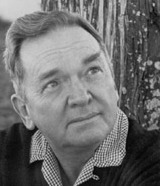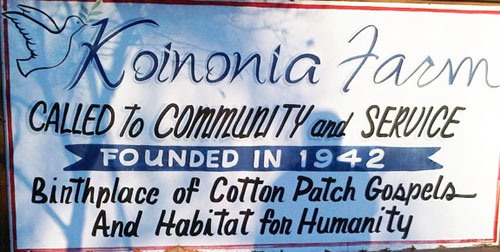By Bob Allen
Last Sunday, July 29, would have been the 100th birthday of Clarence Jordan, a Southern Baptist minister — well known for his Cotton Patch Bible translation — who died in 1969. A month-long celebration of his legacy kicks off Sept. 28-29 with the first-ever Clarence Jordan Symposium at Koinonia Farms, an interracial farming community that he founded in Americus, Ga., 70 years ago this year.
 Former President Jimmy Carter will deliver opening remarks for the event, which features speakers including leaders in the New Monasticism, a movement of intentionally Christian communities cropping up in American cities in recent years.
Former President Jimmy Carter will deliver opening remarks for the event, which features speakers including leaders in the New Monasticism, a movement of intentionally Christian communities cropping up in American cities in recent years.
Amanda Moore, a resident at Koinonia Farms who is handling publicity for the event, said the70th anniversary is important not so much for the number of years it represents, but rather as an effort both to reconnect with people who knew about the ministry in the past but lost touch and to introduce it to a new generation of socially conscious Christians who may not know it is still around.
After earning his Ph.D. in Greek New Testament from Southern Baptist Theological Seminary in 1938, Jordan and his wife, Florence, who died of cancer in 1987 and also would have turned 100 this year, moved with another couple, former American Baptist missionaries Martin and Mabel England, to a 440-acre plot of land in southwest Georgia.
They started an interracial, Christian farming community dedicated to non-violence, environmental stewardship and common possession of goods. They named it Koinonia after the Greek word meaning communion or fellowship used to describe the early church in the second chapter of Acts.
At first the Koinonia community lived at peace with its neighbors in Sumter County, but as the Civil Rights Movement began to emerge in the late 1950s, their notion of radical equality came to be viewed as a threat to the Southern way of life. The next several years witnessed harassment including shootings, burnings, bombings, beatings and a crippling economic boycott.
After things died down some in the 1960s, Jordan turned to writing, churning out a series of New Testament translations called Cotton Patch, which translated not only words but also used American analogies like substituting Washington, D.C., for Rome and Atlanta for Jerusalem. The idea, to divorce the Bible from an ancient past to current times, also meant changing terms like “Jew and Gentile” into “white man and Negro” and “crucifixion” into “lynching,” believing no other term was adequate to convey the sense of the word in common language of the day.
Jordan died Oct. 29, 1969, from a heart attack at the age of 57. At his request he was buried at Koinonia Farms in a plain wooden box in an unmarked grave. Shortly before his death he established the Fund for Humanity to build affordable housing for people in the community.
Later Millard and Linda Fuller, who first visited Koinonia planning only to stay for a couple of hours but wound up making their permanent home there in 1968, expanded the idea into Habitat for Humanity.
The Fuller Center for Housing, started by the Fullers in 2005, is a major sponsor of the Clarence Jordan Symposium.
 Keynote speakers include Jonathan Wilson-Hartgrove, a Baptist minister and author who lives at The Rutba House, a New Monastic community in Durham, N.C. Another is Shane Claiborne, a leading figure in New Monasticism and a founding member of The Simple Way in Philadelphia, featured on the cover of Christianity Today in 2005.
Keynote speakers include Jonathan Wilson-Hartgrove, a Baptist minister and author who lives at The Rutba House, a New Monastic community in Durham, N.C. Another is Shane Claiborne, a leading figure in New Monasticism and a founding member of The Simple Way in Philadelphia, featured on the cover of Christianity Today in 2005.
Others include Charles Marsh, a professor at the University of Virginia and director of The Project on Lived Theology, a research community that seeks to understand the social consequences of religious beliefs, and Philip Gulley, a Quaker pastor from Danville, Ind., who has published 17 books.
The cost for attending the Clarence Jordan Symposium is $195. Student discounts are available. Information about how to register is on the Koinonia website.
The Sept. 26-29 symposium will be followed by Renovation Blitz Build Oct. 1-26 to repair buildings at Koinonia that have gone largely neglected for 70 years. The celebration wraps up with a Koinonia Family Reunion Oct. 26-28, both for those who have visited in the past and those who always wanted to.
In addition to its founding principles, Koinonia Farms today also works in areas like sustainable agriculture, local ministries, an internship program and educational offerings.
